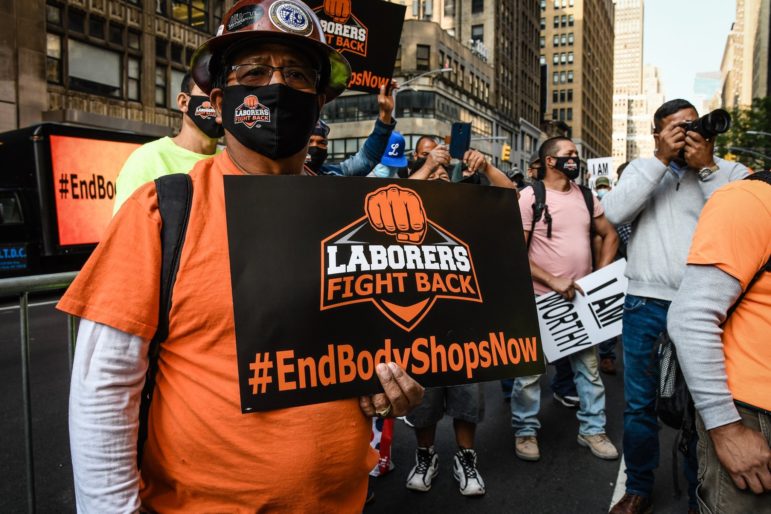‘Body Shops specialize in selling the labor of re-entry workers like me because they know how to take advantage of our unique vulnerabilities as Black workers who spent time behind bars.‘

Laborers’ Local 79
Laborers’ Local 79 members at a rally against “body shops” in 2020.The work done by Black people like me has long been treated as unworthy of a fair wage.
Racial income disparities mean we are paid less, including when we do the same jobs as white people. That’s well-known. What deserves more attention, though, is how these disparities are taking on new and alarming forms in the construction industry here in New York City.
It’s not enough to say Black Lives Matter, especially for those of us who are formerly incarcerated construction workers building a future for this city amid the COVID-19 pandemic.
The next mayor and City Council must show with action, not simply words, how they will make Black lives better, and create more pathways to the middle class for Black New Yorkers who perform some of the most dangerous and exploitive jobs in the whole city.
Many thousands of Black New Yorkers who served time in prison are right now trying to re-enter the economy and make a positive contribution to the neighborhoods where we live and build. Nonunion construction is one of the few industries where we can find jobs after incarceration. We must maintain employment as a condition of parole or go back to prison.
 CityViews are readers’ opinions, not those of City Limits. Add your voice today!
CityViews are readers’ opinions, not those of City Limits. Add your voice today!
That work requirement makes us especially vulnerable to exploitation by the labor brokers who sell our bodies for low-wages to New York City developers and contractors. Real-estate developers have a name for the subcontractors who provide our Black labor: Body Shops. Body Shops get rich by typically charging a developer about $40 an hour for the work of a Black laborer who may be paid as little as $15. And they reveal how much the real-estate development world is willing to degrade and dehumanize us.
Large numbers of re-entry workers are today held captive by Body Shops, because there aren’t many viable employment options when you have a criminal record. We leave the physical jail cell behind only to be imprisoned again in the racial and economic system of Body Shops. When I was working for Spacious Living Group (SLG) I had not heard of Body Shops yet, but I knew what it meant to be paid a fraction of what my hard labor is actually worth.
Body Shops specialize in selling the labor of re-entry workers like me because they know how to take advantage of our unique vulnerabilities as Black workers who spent time behind bars. We are told by our bosses they are doing us a favor by allowing us to work on dangerous construction sites, breaking our backs at low pay for their profit. SLG’s management constantly diminished us—even once trying to stop me from using a public bathroom they themselves were exiting, because a dirty temporary facility was where I belonged. They knew how to hold my criminal justice history over my head, to keep me—for a while, anyway—silent, compliant and underpaid.
Some of the biggest real-estate developers in the city are profiting from Body Shops. They try to insulate themselves from the abuses by pretending all they know about is the low price. But while the Body Shops may be the ones writing our checks, developers are the ones driving the terms of a market in coerced labor. SLG has provided labor to the projects of major developers like Brookfield Properties, Rudin Management, Boston Properties Cape Advisors, and Jonathan Rose projects. Other developers have also used other body shops. I’m talking about Related Companies, The Durst Organization, Tishman Speyer, Extell. The list goes on.
All mayoral candidates and City Council candidates should actively campaign on legislative and policy efforts to help formerly incarcerated construction workers join unions. A key goal and component of COVID recovery should be increasing the number of construction workers and local residents who become union members in communities of color hit hard by the pandemic.
Joining Laborers’ Local 79 transformed my life. With the support of the union, I began to organize my SLG coworkers to demand higher wages and improve my job. When I failed to comply with SLG’s illegal demand to stop organizing, I was fired. But Local 79 helped me file charges with the National Labor Relations Board, which resulted in SLG paying my lost wages.
My compensation increased by almost two-and-a-half times when I finally succeeded in getting out of SLG and began working under a Local 79 collective bargaining agreement. I now work alongside—and am paid the same as—people who were not previously incarcerated. I received a $22 per hour increase from what I received at SLG, including healthcare and retirement benefits. My union membership has helped me achieve middle-class economic security.
There is a lot of discussion among well-meaning progressives about ending mass incarceration and decarcerating New York. But when it comes to improving wages, benefits, working conditions, and union job options for re-entry workers like me, the silence is deafening.
Mike “Millz” Negron is a member of Laborers’ Local 79.









One thought on “Opinion: How NYC’s Leaders Can Empower Black Re-Entry Workers Like Me”
the government must immediately resolve this issue of discrimination immediately